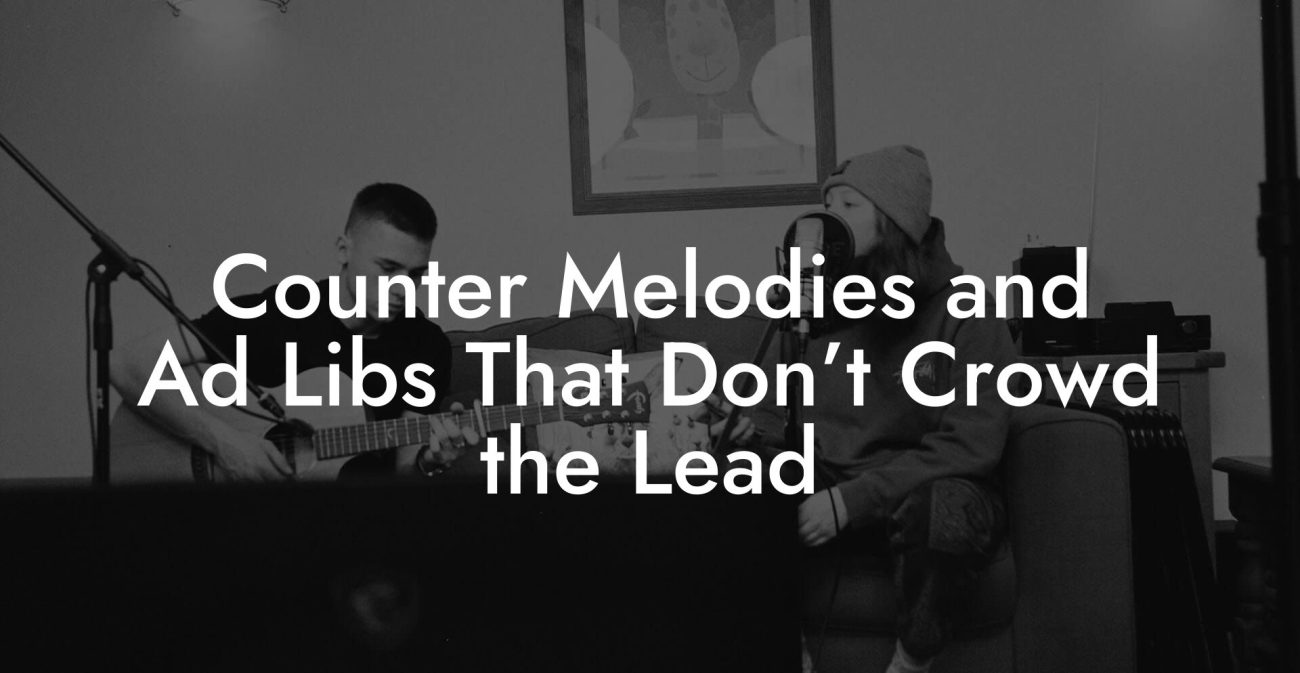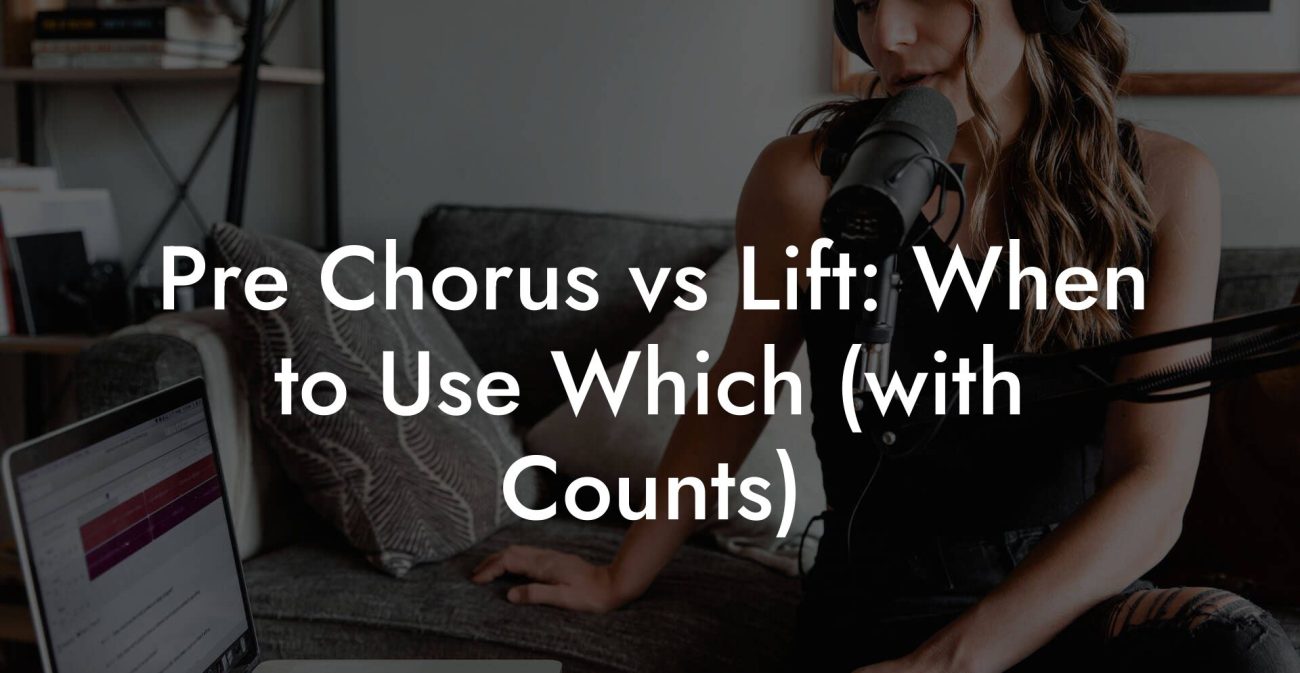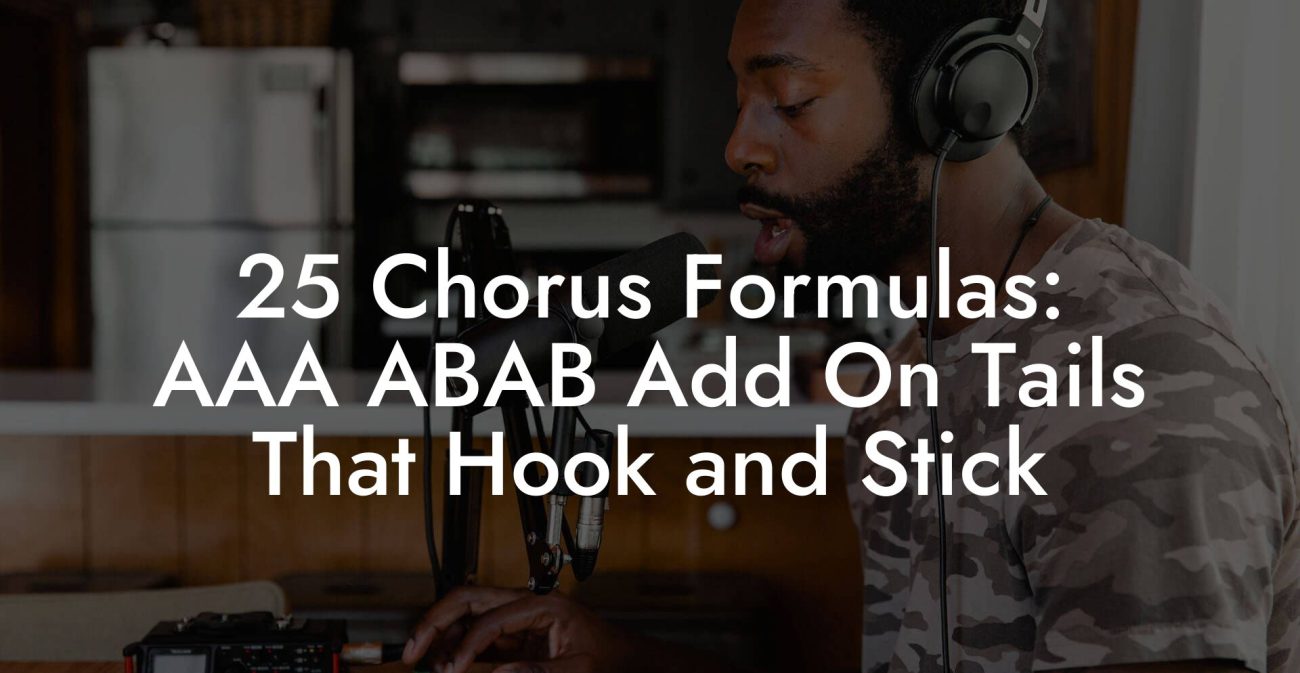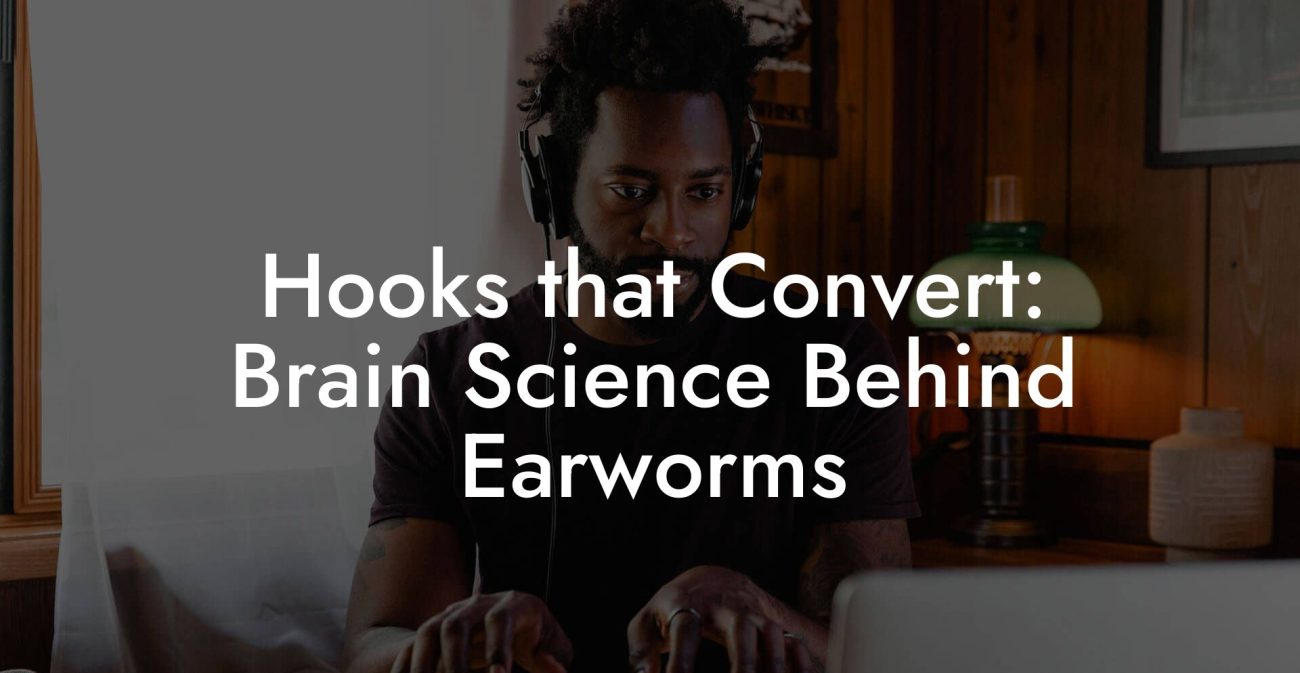Songwriting Advice
Title Testing: 7 Quick Tests to Pick The Stickiest Title
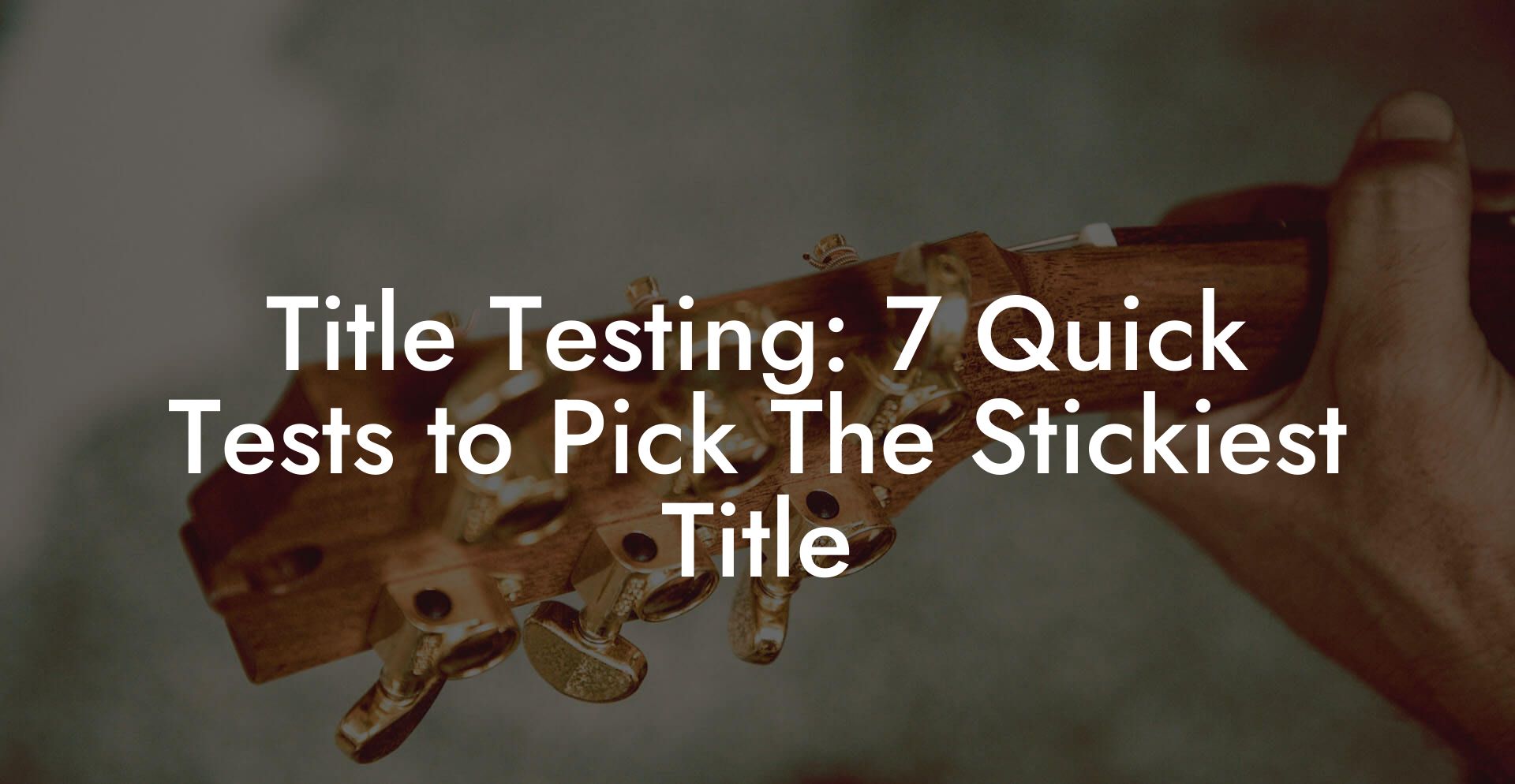
Your title is the handshake before the music even plays. It decides whether fans click, playlist curators notice, and journalists remember. Bad title and your song becomes the one your friends like privately but never tell their group chat about. Good title and your track jumps out of a crowded streaming list like a neon cat with attitude.
Quick Interruption: Ever wondered how huge artists end up fighting for their own songs? The answer is in the fine print. Learn the lines that protect you. Own your masters. Keep royalties. Keep playing shows without moving back in with Mom. Find out more →
Quick Links to Useful Sections
- Why title testing matters for musicians
- How to use this guide
- Quick terminology primer
- The seven tests at a glance
- Test 1 Say It Out Loud Test
- Why this matters
- Quick method
- What to measure
- Real life scenario
- Test 2 First Impression Recall Test
- Test 3 Thumbnail and Metadata Test
- Test 4 Search and Discovery Test
- SEO basics for musicians explained
- Test 5 Social Share and Caption Test
- Test 6 Emotional Promise Test
- Test 7 Legal and Longevity Test
- How to combine the results
- Fast A B testing options that do not cost a fortune
- Cheap ad test method
- Organic poll method
- Before and after examples you can steal
- Example A
- Example B
- Example C
- Common title mistakes and how to fix them
- Title writing prompts you can use in ten minutes
- Action plan for your next release
- Tools and resources
- Title testing checklist you can use right now
- FAQ
This guide gives you seven practical tests to run in minutes so you pick a title that sticks. Everything here is written for busy musicians and artists who want results and not a slow science fair. We will cover voice, memory, thumbnails, search, social, emotion, and legal sanity checks. For every test you get a quick method, the exact thing to measure, and a real life example that matters to a songwriter or an indie artist.
Why title testing matters for musicians
Titles are tiny but mighty. They show up in search results, playlist metadata, social captions, and screenshots. A sticky title increases share rate, playlist adds, and the chance a DJ remembers it three hours into a gig. The streaming era turned titles into mini marketing assets. Your song can be sonically perfect and still sink if the title is forgettable or confusing.
Think of a title like a visual hook for your song. It helps people file the song in memory. If the title is easy to say, easy to type, and emotionally clear, listeners are more likely to text it, hum it, or search for it later. That is how songs go from one listener to ten thousand.
How to use this guide
Run every test fast. Each test takes between ten seconds and thirty minutes depending on depth. Use the quick versions for a single release. Use the full versions if you are building a brand around a record or a persona. Keep a single list of your top three candidate titles and run the tests across those three. Record a single metric for each test so you have data to compare.
Quick terminology primer
- Sticky means memorable and shareable.
- SEO stands for search engine optimization. That is the practice of making things easy to find in search results on Google, YouTube, or streaming services.
- Metadata is the small bits of text attached to a track like title, artist, album, and release date.
- CTR stands for click through rate. It measures how many people click compared to how many saw the title or thumbnail.
- A B test means comparing two options to see which performs better. It is pronounced A slash B or A versus B.
The seven tests at a glance
- Say It Out Loud Test
- First Impression Recall Test
- Thumbnail and Metadata Test
- Search and Discovery Test
- Social Share and Caption Test
- Emotional Promise Test
- Legal and Longevity Test
Test 1 Say It Out Loud Test
This is the shockingly simple test everyone skips. If a title is not easy to say, listeners will not recommend it in conversation and DJs will not remember it in the middle of a set.
Why this matters
Music travels by mouth. A title that trips over the tongue becomes a private earworm and nothing more. If a listener cannot say the title without stumbling they will avoid telling anyone. That kills word of mouth fast.
Quick method
- Say each candidate title out loud five times fast like you are introducing it to a club crowd. Use different volumes and moods.
- Record yourself saying it and play it back without context. How natural does it sound?
- Ask two friends on a voice message to repeat the title back immediately. See if any mispronounce or change words.
What to measure
Count errors. If more than one in three people changes a word or stumbles then the title fails. If everyone repeats it cleanly then you pass. Also note how it feels to sing. Singability matters for social video and live shout backs.
Real life scenario
You are at a rooftop with a friend and you want her to remember the new single to add to a shared playlist. You try saying the title like a proof of concept. If she shrugs and asks for spelling you lost the moment. If she says it back with feeling you have a winner.
Test 2 First Impression Recall Test
This measures memory after a tiny exposure. It is a quick way to estimate stickiness.
Why this matters
Most people hear a song and keep walking. If they cannot remember the name five seconds later they cannot ask a friend for it. A memorable title survives the noise of real life.
Quick method
- Show three candidate titles to five strangers for exactly five seconds each like you are doing a flash card test.
- After a thirty second filler task ask them to write down any title they remember.
- Record which title they recall and whether they confuse similar words.
What to measure
Measure recall rate in percent. If one title has a recall rate 20 points higher than the others it is probably the stickiest. Even small differences matter. Imagine a title with 60 percent recall versus one with 35 percent recall. The 60 percent title is more likely to spread.
Real life scenario
You run into fans between set times and only have half a minute. You want them to remember the new single to tell roommates later. Use this test to simulate that moment and pick the title that survives a distracted brain.
Test 3 Thumbnail and Metadata Test
People mostly discover music through visual lists on streaming services. The title must work as a tiny text object beside your artwork. This test shows how the title behaves where space is cruel.
Why this matters
In a playlist view the title is a strip of text usually next to an album cover or artist photo. If the title truncates badly or looks like a weird sentence fragment it will not read well. The title must be coherent when shortened and when combined with artist name and album name.
Quick method
- Create mock playlist thumbnails for desktop, mobile, and a share screenshot. You can use a screenshot from Spotify or Apple Music as a template and paste your title in place.
- Look at how the title truncates. Does it cut mid word? Does it leave a confusing tail?
- View the title at tiny sizes like a phone notification or a small social thumbnail. If possible, take a photo of your screen to mimic low quality displays.
What to measure
Note where truncation happens. Good titles keep the core idea in the first three to five words. If your title relies on a late word for meaning then the thumbnail kills it. If it reads clearly at small sizes you win.
Real life scenario
You imagine your song appearing on a sleepy Sunday playlist while someone scrolls on a cramped subway. The thumbnail test tells you whether the title will still say something when it is reduced to 30 pixels high.
Test 4 Search and Discovery Test
This is the SEO test. It checks how easy your title is to find in search engines and streaming service search. Discoverability is a survival skill in modern music.
Why this matters
If someone hears your song on a story or in a bar and wants to find it later they will search. If your title is generic it will float under a sea of search results. If it is too weird people will misspell it and still not find it. The ideal title balances uniqueness and discoverable keywords.
Quick method
- Search the candidate title in Google, YouTube, and Spotify. Also search the title plus your artist name.
- Note number of exact matches. Pay attention to top results on the first results page. If your title returns existing songs then consider variations.
- Try common misspellings and punctuation variants. See how forgiving search is for your title.
What to measure
Record rank of likely desired result. If your song or a placeholder page is not on the first page then your title may be lost to discovery. If the search returns many unrelated results you need to add a distinctive second word or consider a subtitle.
SEO basics for musicians explained
Search engines and streaming platforms index title text and artist name. They also look at metadata like ISRC codes and release dates. SEO for titles means choosing words that are not so common they disappear for example love or night and not so idiosyncratic that fans cannot guess them. A small modifier like a location or a quirky verb can move you from anonymous to findable.
Real life scenario
A DJ posts a story with your song and no link. Fans screenshot and try to search later. If your title competes with hundreds of other tracks the search fails. The search test tells you whether the title can be found by a sleepy fan two hours after a live show.
Test 5 Social Share and Caption Test
This test checks how the title behaves on social networks like Instagram, TikTok, Twitter, and Facebook where people share songs as captions and story stickers.
Why this matters
Titles are often used as captions when people post snippets. The best titles double as memorable captions or hashtags. A title that is awkward as a caption reduces the chance fans will tag you or use it as a punchline in a clip.
Quick method
- Write three mock captions or hashtags for each candidate title. Keep them short enough to be readable on a phone screen.
- Paste the title into a mock TikTok caption box or a story text sticker and see how it looks over a video. Does it fit the visual composition? Is it readable in one glance?
- Try converting the title into a hashtag. If the hashtag runs words together check if the meaning survives or becomes a train wreck of letters.
What to measure
Rate readability and shareability on a scale from one to five. If a title becomes a confusing hashtag or a caption that looks like a sentence fragment then you lose organic sharing potential. If it reads like a chant or a clever caption you gain free promotion.
Real life scenario
A fan records a dance clip and needs a caption. They want to write something clever but also short. If your title is caption friendly they hit share. If not they pick a generic line and forget to tag you.
Test 6 Emotional Promise Test
This one is less technical and more psychological. It asks whether the title communicates a single feeling or promise that matches the song. Titles that promise too many things confuse the brain. Titles that promise the right feeling invite a reaction.
Why this matters
Listeners choose songs to match or modify their mood. A title that says exactly what the song evokes helps the listener decide quickly. A title that is vague forces a preview listen and often loses out.
Quick method
- Write one sentence that sums the song in plain language like you are texting a friend about why the song matters.
- Compare each candidate title to that sentence. Which title matches the promise most directly?
- Ask five people to choose which title they would pick for that sentence and why.
What to measure
Measure alignment rate. If one title matches the core promise for most people it is the best fit. If titles split votes wildly you may have a song that needs stronger identity not a title change. Keep your promise clear and the name will amplify it.
Real life scenario
You have a melancholic breakup song that is also kind of sarcastic. A title that reads sad might mislead fans. The emotional promise test shows whether a title conveys the mood you want to sell in playlists and social videos.
Test 7 Legal and Longevity Test
This test is about not getting sued and not being confused for someone else. It also checks whether the title will age badly or lock you into an awkward corner.
Why this matters
Titles rarely get you sued but trademark conflicts with band names or album names can cause headaches. Also a title that references a passing meme or a very specific cultural moment may feel dated fast. This test helps you avoid landmines.
Quick method
- Search the US trademark database or the trademark database in your country for the exact title as a musical work or band name. You do not need a lawyer for the first pass.
- Search social platforms and streaming services for bands or artists that use similar titles. If a prominent act uses the title you risk confusion.
- Ask whether the title ties you to a trend that will expire. If yes think about whether that is your goal. Trend tied titles can spike and die quickly.
What to measure
Note any exact matches and any likely confusion cases. If a trademark exists for music use that is a red flag. If a high profile artist has a song with the same title that is current then consider a variation. For longevity think in years. Will the title still make sense in five years?
Real life scenario
You love the title named after a viral catchphrase. It may attract clicks now but in two years it could make playlists cringe. The longevity test helps you decide if you want a fast burn or a slow oak tree career move.
How to combine the results
Score each candidate title on each test from one to five. Use a quick spreadsheet or a piece of paper. You do not need perfect science. The goal is to see patterns. One title may be slightly worse in search but far better in social shareability. Weight tests according to your release strategy. If you live on TikTok make social share worth double. If you rely on editorial playlists give the thumbnail and search tests more weight. If you are touring and need a chantable title give the say it out loud test extra weight.
Fast A B testing options that do not cost a fortune
If you have a tiny budget and want hard numbers use cheap ad tests and organic polls. Advertised tests measure CTR and conversion. Organic tests measure real fans behavior.
Cheap ad test method
- Create a simple landing page with a clip of the song and a pre save or waitlist sign up. Use services like Linktree or a simple landing builder.
- Run separate ads with the same visual and audio but different titles. Keep ad spend low like five to ten dollars per title in a single market.
- Compare CTR and sign up rate. Higher CTR means the title grabbed attention. Higher sign up rate means the title and the clip combined created desire.
Organic poll method
- Post a story poll on Instagram or TikTok asking followers to choose between two titles. Use the same short audio clip or a mood photo to keep variables low.
- Measure votes and also track comments for qualitative data.
Ad tests give stronger numbers but cost money and require a landing page. Organic polls are cheap and quick but can be biased by follower taste. Use both if you can.
Before and after examples you can steal
Here are quick examples showing how small changes made titles stickier.
Example A
Before The Night We Broke Things
After We Broke Things
Why it works: The shorter version is punchier and easier to say. It contains the same promise but removes filler words that are invisible in thumbnails.
Example B
Before Lost in My Feelings Again
After Lost in Feelings
Why it works: Shorter and more searchable. The core emotion is front loaded which improves recall and tagability.
Example C
Before Love Like A Train At Dawn
After Dawn Train
Why it works: The new title is unique, visual, and unlikely to be confused with other songs. It also forms an easy hashtag.
Common title mistakes and how to fix them
- Too long Try to keep titles under five words when possible. Long titles truncate in thumbnails and make hashtags ugly.
- Generic words only Add one specific word to move from anonymous to searchable. For example change Bridge of Love to Bridge Over Blackwater or Bridge at Dawn.
- Trend locked If the title depends on a meme be ready for short shelf life. If you want longevity choose imagery that can age.
- Weird spelling for style Weird spelling can look clever but makes search and recall harder. Use intentionally odd spellings only if you have a big fan base that will copy it.
- Title clashes with popular songs Search test and trademark test can save you from a title that will be invisible.
Title writing prompts you can use in ten minutes
- Write the emotion in one plain sentence. Turn the most vivid noun into a title.
- Pick one concrete image from the song and try that as a title. Images beat adjectives.
- Make three short title options and run the say it out loud test. Keep the one that is easiest to shout in a crowd.
- Try the reverse title trick. Take a line from the chorus and remove the verbs. See if the remaining words make a punchy title.
Action plan for your next release
- Draft three candidate titles for your song.
- Run the seven tests in quick form with five people or with cheap ad budget if possible.
- Score each title. Weight tests according to your strategy. Pick the winner.
- Create mock thumbnails and social captions and run a final sanity check. Do a search test for final confirmation.
- Lock the title and update metadata everywhere including pre save pages and distributor forms. Consistency matters for search.
Tools and resources
- Google search and Google trends for basic SEO testing.
- Spotify and Apple Music search for discovery checks.
- Instagram and TikTok story polls for quick organic data.
- Cheap ad platforms like Facebook Ads Manager for low cost CTR testing.
- Trademark portals in your country for initial legal checks. For the United States use the USPTO search. In the UK use the Intellectual Property Office website.
Title testing checklist you can use right now
Copy this into a note and use it for each candidate title.
- Say It Out Loud Test passed yes or no
- First Impression Recall Test percent
- Thumbnail read clarity yes or no
- Search result rank page number
- Social caption friendliness score one to five
- Emotional promise alignment percent
- Trademark conflict yes or no
FAQ
How many title options should I test
Three is a solid number. It is enough to create contrast without analysis paralysis. If you have unlimited time you can test more but the incremental benefit drops fast. Keep the set small and run the tests quickly. Music moves faster than spreadsheets.
What if my title fails one test but wins the others
Weigh the failed test by importance. If the failed test is search and you rely on search traffic heavily then that is a blocker. If the failed test is legal then fix it. If the failed test is say it out loud but you are targeting a production heavy scene where people read set lists then you might accept lower verbal recall. Always align tests with your release goals.
Can I change a title after release
Changing a title after release is messy. Streaming metadata is sticky. You can append parentheses like original title parenthetical new title or release a remaster with a slightly adjusted title but doing so splits streams and confuses fans. Title testing before release is far cheaper than a post release fix.
Should I include punctuation in a title
Punctuation can be dramatic but it can also be invisible in thumbnails and search. Avoid relying on punctuation for meaning. If punctuation is essential to your artistic identity make sure it also reads fine without and test that spelling and search survive both versions.
How do I test titles for album or EP names differently
Album titles can be more abstract because they live on covers and have supporting materials like liner notes. They also represent a larger brand moment so longevity matters more. Run the same seven tests but give longevity and legal tests heavier weight. Also test how the album title looks on vinyl, merch, and tour posters.
Can I use foreign language words in titles
Yes and sometimes you should. Foreign words can be distinctive and beautiful. Test them with the same methods. Check that fans in your target market can pronounce and search for the word. If it is too obscure you risk losing discoverability unless you have a strategic reason for using it.
What is a good threshold for the recall test
A practical bar is 50 percent recall or higher in a quick test of casual listeners. If you are targeting superfans the bar can be lower because they will dig deeper. For mass market goals aim for recall rates well above 50 percent during a flash exposure test.

